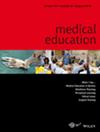Associations between daily wellness behaviours and outcomes among medical students: A longitudinal nightly survey study
Abstract
Background
Previous research on medical student wellbeing has examined single wellness-related behaviours in isolation and relied on cross-sectional or pre-post surveys. The objective of this study was to use daily, app-based surveys to examine which wellness behaviours have the strongest associations with positive wellbeing in a medical student sample.
Methods
A total of 213 medical students willing to participate were enrolled in this study during summer 2021. Participants completed nightly surveys on a novel smartphone app, which assessed eight wellness-related indicators (e.g., social interaction, sleep, exercise, nutrition) and four wellbeing outcomes (mood, focus, stress, overall wellbeing). Both same-day and next-day associations between indicators and outcomes were assessed.
Results
Of the 213 participants enrolled, 116 completed more than 50% of nightly surveys, providing 7043 observations over 3 months. All wellbeing outcomes varied significantly within a given week, with peak stress and lowest mood and wellbeing levels at the midweek mark. In cross-sectional/same-day analyses, quality of social interactions, sleep quality and nutrition had the strongest associations with same-day outcomes. The cumulative impact of engaging in these wellness indicators was equal to a one standard deviation higher score on same-day wellbeing and mood outcomes. In longitudinal/next-day analyses, quality of social interactions and sleep quality had the strongest associations with outcomes, but the associations were generally modest compared to same-day results.
Conclusions
A specific set of daily wellness behaviours may have substantial associations with mood, wellbeing and other positive outcomes, but the carryover of these behaviours to the next day is limited. Medical schools should test interventions that target multiple wellness activities and find ways to prompt these behaviours daily.





 求助内容:
求助内容: 应助结果提醒方式:
应助结果提醒方式:


